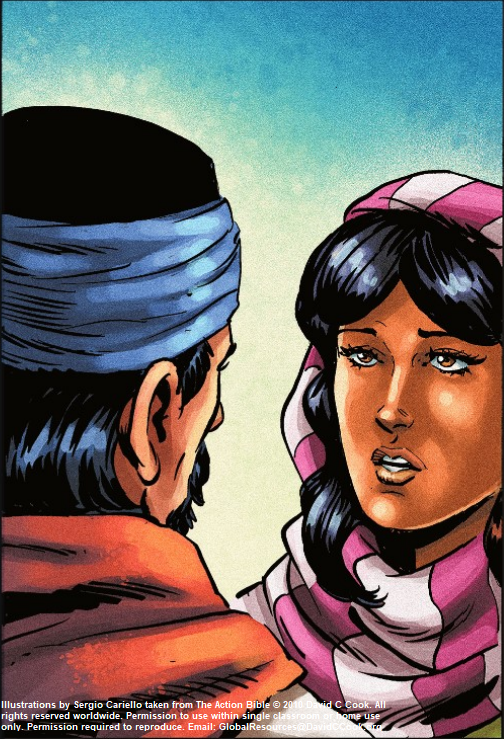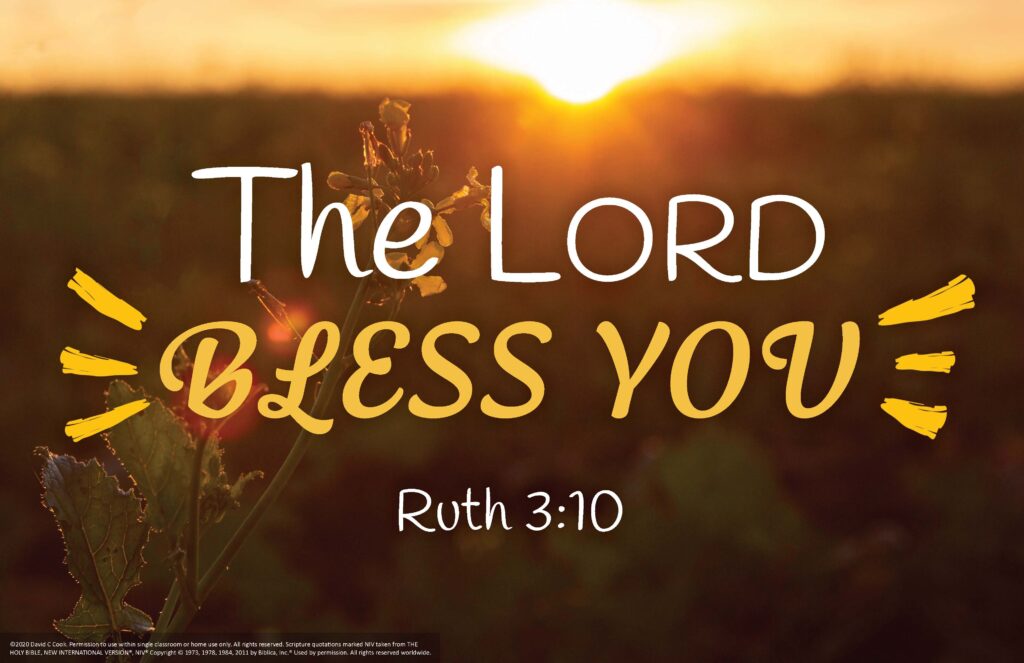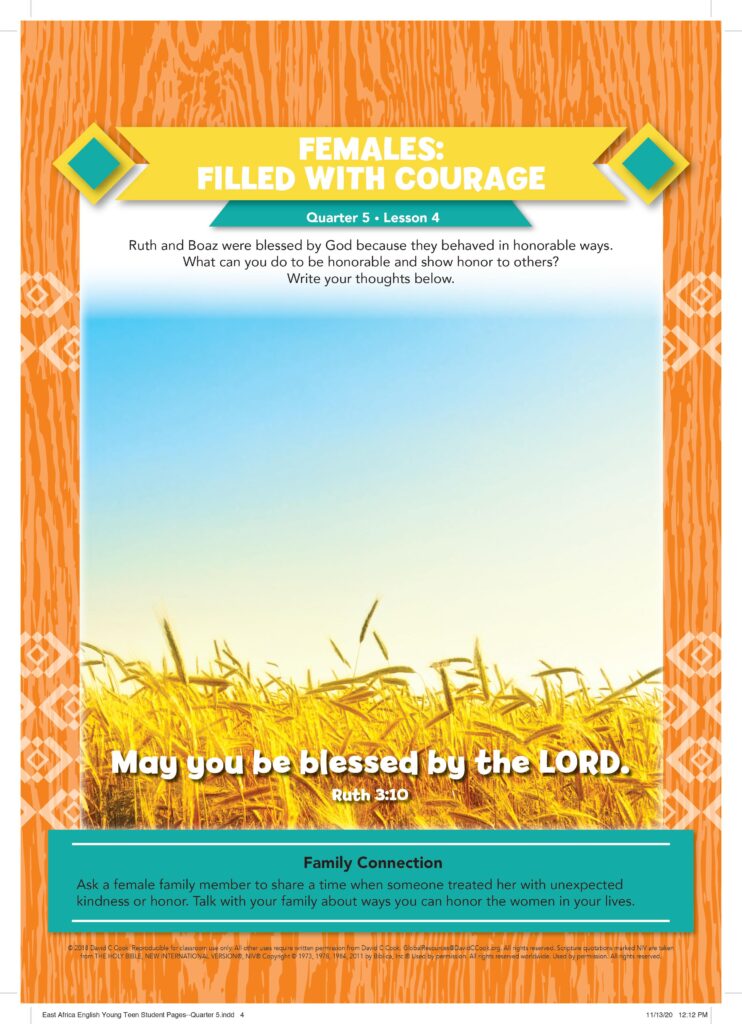During the lesson, the information for you to know is written in regular type, and what we suggest speaking or reading aloud to children is in bold. All resources for this lesson, including the Teacher Guide, Student Page, Family Connection Card, and other resources can be downloaded in a ZIP file by clicking on the following link:
In some lessons you will find "resource articles." These are articles written by experts from around the world to help equip you for your work with children and adolescents. Share them with parents or guardians if you consider it appropriate.
Do nothing out of selfish ambition or vain conceit. Rather, in humility value others above yourselves.
Philippians 2:3
Though each of us has different talents, gifts, and abilities, we are all equally loved by God. Every human being is valuable to Him. The beggar. The murderer. The AIDS sufferer. The child slave. The abuser. The prostitute. The unborn baby. The widow. The orphan. Jesus died for each one.
Do you treat others as He would treat them? It takes courage to love and honour others as Jesus did. Spend a few minutes in a public place. Look for people your culture tells you are less valuable, and pray for them. If you sense the Holy Spirit urging you to talk with them, do so. Otherwise, pray silently for them. You may never know how God answers your prayers. But you can be sure that God knows every person you see. He loves each one and died for each one. And He calls you to be courageous in the ways you honour others.
Encourage the students to ask a female family member to share a time when someone treated her with unexpected kindness or honour and to share how this felt. Encourage the students to talk with their families about practical ways they can honour the women in their lives.
Teacher Tip: If possible, email or text the Family Connection Card to the families of your students.
As the students arrive, give some of them a compliment. Compliment the student in ways that are common for the gender of that student. For example, you might tell the girls they are pretty and kind and the boys that they are strong and brave. Use the same 2 compliments with all the girls and the same 2 compliments with all the boys. Give a compliment to most of the students but not all of them.
After all the students have arrived, start the discussion.
Allow 8–10 students to share. Call on boys and girls. Help the students see that all the girls received compliments that are common for girls and the boys all received compliments that are common for boys.
All the girls received the same compliments and all the boys received the same compliments.
These compliments are stereotypes. Stereotypes are widely held ideas that are overly simplified, stating that there is a fixed pattern to how certain people are. They are traditional and cultural beliefs based on what people think about a certain type of person. There is usually some truth in them, but they are not true for every person. For example, I described the young men as strong and courageous and the young women as pretty and kind. But do you know any handsome and kind men? And do you know any strong and courageous women?
Students may answer kind, loving, nurturing, timid, soft-spoken, or other traditionally female character traits.
Students share answers such as courageous, strong, proud, aggressive, or other traditionally male character traits.
Students may answer that they felt left out or hurt.
If you did not receive a compliment, you may have felt that you were not as important or as valuable as the others.
Allow students to share their thoughts.
These are stereotypes too. Someone who is poor is not less valuable than someone who is rich. Someone who is disabled is just as important as someone who is not. And someone who is from a different culture or tribe is not less valuable than we are. All cultures judge people using stereotypes. But God tells us to treat others with honour, regardless of who they are.
Have the students turn to a neighbour to answer the following question.
Allow the students to share their answers with partners.
Even in Bible times, there were stereotypes. Women relied on their husbands for food and money and were not considered equal in value to men. Some men were kind to their wives and other women, and some were not. The poor, the sick, and the disabled were not valued as highly as others. People from other countries were not treated with the same honour.
The Bible is filled with stories of courageous people who did not judge others by stereotypes. Instead, they followed God and saw themselves and others as He does. Let’s learn about one of those people.
Divide the class into 2 groups. They will remain in their groups for the rest of this lesson.
If you are using the images from The Action Bible, show them as you tell the story.
Naomi and her daughters-in-law, Orpah and Ruth, lived in Moab. Their husbands had died, and they were all alone—without any way to provide food or shelter for themselves. Naomi decided to return to Israel. She told Orpah and Ruth to stay in Moab, where they might find new husbands from among their own people. Orpah decided to stay in Moab. Let’s read the Bible to see what Ruth decided to do.
Have a student read Ruth 1:16–17 aloud from the Bible. If that is not possible, the passage is printed here.
But Ruth replied, “Don’t urge me to leave you or to turn back from you. Where you go I will go, and where you stay I will stay. Your people will be my people and your God my God. Where you die I will die, and there I will be buried. May the LORD deal with me, be it ever so severely, if even death separates you and me.”
Ruth 1:16–17
Have the students answer the following questions in their groups.
Students may answer that she loved her mother-in-law or that she had no one else to care for her and to care for.
Students may answer that she was loyal and loving, she was brave for leaving her people, and she was a follower of God.
Naomi returned to Israel with Ruth. Though she was a foreigner who had worshipped different gods, Ruth loved Naomi and was loyal to her. Ruth and Naomi arrived in Bethlehem when farmers were beginning to harvest their barley fields. At that time, it was common for poor people to go behind the harvest workers and collect the leftover barley on the ground. Ruth collected grain in the field of Boaz, a relative of Naomi’s husband, so she and Naomi would have food to eat.
Have a student read Ruth 2:3–7 aloud from the Bible.
So she went out, entered a field and began to glean behind the harvesters. As it turned out, she was working in a field belonging to Boaz, who was from the clan of Elimelek. Just then Boaz arrived from Bethlehem and greeted the harvesters, “The Lord be with you!” “The Lord bless you!” they answered. Boaz asked the overseer of his harvesters, “Who does that young woman belong to?” The overseer replied, “She is the Moabite who came back from Moab with Naomi. She said, ‘Please let me glean and gather among the sheaves behind the harvesters.’ She came into the field and has remained here from morning till now, except for a short rest in the shelter.”
Ruth 2:3–7
If possible, show the students the images from The Action Bible.

Have the students answer the following questions in their groups.
Students may answer that Boaz was kind and cared for others.
Let’s read more of the story to find out how Boaz responded to Ruth.
Ask a student to read Ruth 2:8–13 aloud from the Bible.
So Boaz said to Ruth, “My daughter, listen to me. Don’t go and glean in another field and don’t go away from here. Stay here with the women who work for me. Watch the field where the men are harvesting, and follow along after the women. I have told the men not to lay a hand on you. And whenever you are thirsty, go and get a drink from the water jars the men have filled.” At this, she bowed down with her face to the ground. She asked him, “Why have I found such favor in your eyes that you notice me—a foreigner?” Boaz replied, “I’ve been told all about what you have done for your mother-in-law since the death of your husband—how you left your father and mother and your homeland and came to live with a people you did not know before. May the LORD repay you for what you have done. May you be richly rewarded by the LORD, the God of Israel, under whose wings you have come to take refuge.” “May I continue to find favor in your eyes, my lord,” she said. “You have put me at ease by speaking kindly to your servant—though I do not have the standing of one of your servants.”
Ruth 2:8–13

Have the students answer the following questions in their groups.
Boaz responded to Ruth with kindness. He told her to continue gleaning in his fields and told his male workers to show respect to her as well. He also told her to drink his workers’ water when she was thirsty. Boaz told Ruth he noticed the kindness she had shown to Naomi, and he blessed her.
Boaz did more than was expected of him. At that time, landowners were required to leave a little bit of grain at the edges of their fields for those who were poor. Foreigners would only get what was left after the needy people of the community had taken what they needed. By allowing Ruth to follow the workers in the field, he was treating her with great honour.
Also, in Israel during this time, if a man died without having a son, the redeemer was supposed to marry his widow. A “redeemer,” or “kinsman-redeemer,” was a close relative who helped in times of need. Because Boaz was related to Naomi’s dead husband, he was a kinsman-redeemer. Naomi knew that if Ruth married Boaz, he would take good care of both of them. So Naomi told Ruth to let Boaz know she was interested in marrying him. Ruth did what Naomi had asked.
Students may answer that Ruth followed Naomi’s advice.
Let’s hear how Boaz responded to Ruth.
Have a student read Ruth 3:10 aloud from the Bible. If that is not possible, the verse is printed here for you.
Show the Memory Verse poster, if you are using it.
“The Lord bless you, my daughter,” he replied. “This kindness is greater than that which you showed earlier: You have not run after the younger men, whether rich or poor.
Ruth 3:10

Address the next question to the whole class.
Allow 2–3 students to share their thoughts.
When Boaz blessed Ruth, he called her “my daughter.” Ruth was not his daughter, but Boaz used this as a term of endearment to show he cared for her. Boaz married Ruth, and they had a son named Obed. Obed eventually became the father of Jesse, who was the father of King David. Ruth and Boaz were the great-grandparents of Israel’s greatest king—and distant ancestors of Jesus.
Have students discuss the next question for 2–3 minutes with their groups. Then allow 2–3 students to share their thoughts with the whole class.
Both Ruth and Boaz were courageous. They always treated others with honour, even in ways that were unexpected. They allowed their actions to reflect God’s view of others.
Think about women you know who show courage and behave in honourable ways, as Ruth did. Think of 1 thing you can do to be honourable. Share this with your group.
Now think of men you know who show courage and treat women in honourable ways, as Boaz treated Ruth. Think of 1 way you can show honour to others as Boaz did. Share your example with your group.
God calls His followers to live lives of faithfulness to Him. One way we can honour God is by valuing and honouring women. We will begin by showing honour to the young women in our class. If you are a young woman, you can honour yourself by believing God’s truth about who you are. If you are a young man, you can begin to see women the way God does.
Optional: If you are using the Student Pages, the teens can use their pages to respond.

Have all your female students form a circle in the centre of your teaching area and sit down. Ask the male students to sit quietly and wait respectfully while you address the young ladies. Thank them for their patience.
Ask your female students to close their eyes and listen carefully as you read words of truth about who they are as women. If they struggle to believe any of the truths you read, encourage them to ask God to open their hearts to believe His truth. Read the following paragraph slowly. If time allows, read it 2 times.
God created you in His image. You are creative and intelligent, unique and compassionate. You are a masterpiece! Jesus loves you so much that He died on the cross to pay the price for your sins. You are precious to God, and He values you more than silver or gold or any treasure.
Have your male students stand in a circle around the young women, who should remain seated.
Long ago, Boaz showed kindness, generosity, and honour to Ruth, and he blessed her in the name of the Lord. Today, the young men in our class have the opportunity to honour the young women in the same way.
Encourage your male students to reach their hands out towards the female students as a symbol of blessing them and lifting them up to God. They should not actually touch them. Have the young men repeat each line of the blessing after you. After the blessing, give them a chance to pray for young women with their own words out loud or silently.
Have all your students form a large circle. Close class by blessing the young men and young women together with words based on Ruth 3:10.
Blessing: May you be blessed by the Lord. May you know that the Creator of the universe made you and loves you. You are a valuable treasure to Him. May you see every person in your life, man or woman, as God does—as unique and precious. And may you show courage as you treat others with honour.
Lead the teens in singing this quarter’s song, if possible.
Life on Life ©2020 David C Cook. Reproducible for home or classroom use only. All other uses require written permission from David C Cook [email protected]. All rights reserved.